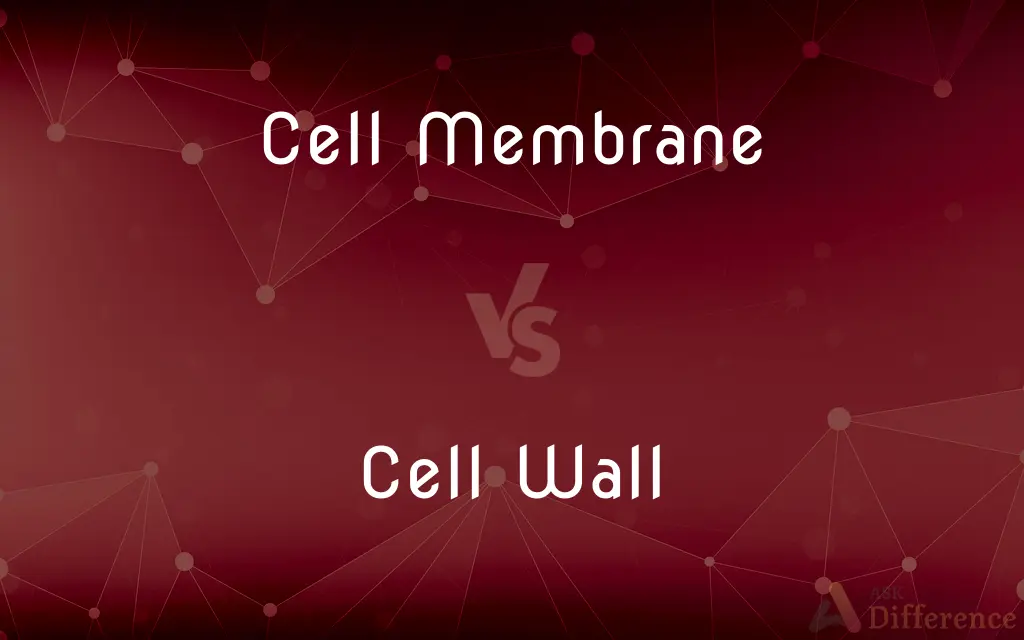Cell Membrane vs. Cell Wall — What's the Difference?
By Tayyaba Rehman — Published on October 22, 2023
Cell Membrane is a semi-permeable barrier enclosing cell contents; Cell Wall is a rigid structure providing support, mostly in plants.

Difference Between Cell Membrane and Cell Wall
Table of Contents
ADVERTISEMENT
Key Differences
Cell Membranes are made up of a phospholipid bilayer interspersed with proteins. This structure ensures selective permeability, allowing certain molecules to pass through while keeping others out. The Cell Wall, however, consists of cellulose in plants, chitin in fungi, and peptidoglycan in bacteria, lending it rigidity and strength.
Tayyaba Rehman
Oct 22, 2023
The flexibility of the Cell Membrane supports dynamic cellular processes, including endocytosis and exocytosis. The Cell Wall, being more static, primarily offers mechanical support, preventing plant cells from bursting due to osmotic pressure.
Tayyaba Rehman
Oct 22, 2023
The Cell Membrane, present in all cells, functions as a protective barrier that regulates the entry and exit of substances. On the contrary, the Cell Wall is an external, rigid structure that gives additional support and protection, primarily found in plants, fungi, and certain prokaryotes.
Tayyaba Rehman
Oct 22, 2023
While the Cell Membrane is essential for maintaining cellular homeostasis, the Cell Wall plays a pivotal role in the overall structural integrity of plants, fungi, and certain bacteria. Both these components, though serving different primary functions, are integral for the survival and function of the cells they encase.
Tayyaba Rehman
Oct 22, 2023
Definitions
Cell Membrane
Cell Membrane plays a role in cellular communication.
Receptors on the Cell Membrane receive signals from other cells.
Tayyaba Rehman
Oct 05, 2023
ADVERTISEMENT
Cell Wall
Cell Wall composition varies among organisms.
While plants have a cellulose-based Cell Wall, fungi have one made of chitin.
Tayyaba Rehman
Oct 05, 2023
Cell Membrane
Cell Membrane maintains cellular homeostasis.
By regulating substance movement, the Cell Membrane ensures a balanced internal environment.
Tayyaba Rehman
Oct 05, 2023
Cell Wall
Cell Wall provides protection against external stress.
The Cell Wall protects plant cells from bursting under high osmotic pressure.
Tayyaba Rehman
Oct 05, 2023
Cell Membrane
Cell Membrane is the semi-permeable layer surrounding cell contents.
The Cell Membrane controls the movement of substances into and out of the cell.
Tayyaba Rehman
Oct 05, 2023
Cell Wall
Cell Wall is a rigid structure surrounding some cells.
The Cell Wall gives plants their structural rigidity.
Tayyaba Rehman
Oct 05, 2023
ADVERTISEMENT
Cell Membrane
Cell Membrane is involved in endocytosis and exocytosis.
The Cell Membrane can engulf particles or release substances using vesicles.
Tayyaba Rehman
Oct 05, 2023
Cell Wall
Cell Wall aids in maintaining cell shape.
Thanks to the Cell Wall, plant cells retain a consistent shape even when turgid.
Tayyaba Rehman
Oct 05, 2023
Cell Membrane
Cell Membrane consists of a phospholipid bilayer.
The Cell Membrane's unique structure ensures its selective permeability.
Tayyaba Rehman
Oct 05, 2023
Cell Wall
Cell Wall is absent in animal cells.
Unlike plant cells, animal cells lack a Cell Wall, making them more flexible.
Tayyaba Rehman
Oct 05, 2023
FAQs
Do all cells have a Cell Wall?
No, only plants, fungi, and certain prokaryotes have a Cell Wall.
Tayyaba Rehman
Oct 22, 2023
What primarily composes the Cell Membrane?
The Cell Membrane is primarily composed of a phospholipid bilayer with embedded proteins.
Tayyaba Rehman
Oct 22, 2023
Which cellular structure regulates substance movement?
The Cell Membrane regulates the movement of substances into and out of the cell.
Tayyaba Rehman
Oct 22, 2023
Can substances freely pass through the Cell Membrane?
No, the Cell Membrane is selectively permeable, only allowing certain substances through.
Tayyaba Rehman
Oct 22, 2023
What would happen to a plant cell without a Cell Wall in a hypotonic solution?
Without a Cell Wall, the plant cell could burst due to osmotic pressure.
Tayyaba Rehman
Oct 22, 2023
What is the significance of the Cell Wall in fungi?
In fungi, the Cell Wall made of chitin provides protection and structural support.
Tayyaba Rehman
Oct 22, 2023
How does the Cell Wall aid in preventing water influx in hypotonic solutions?
The Cell Wall provides rigidity, preventing the cell from over-expanding and potentially bursting due to water influx.
Tayyaba Rehman
Oct 22, 2023
Why don't animal cells have a Cell Wall?
Animal cells rely on other structural and functional mechanisms and don't require the rigidity provided by a Cell Wall.
Tayyaba Rehman
Oct 22, 2023
Why is the Cell Wall important for plants?
The Cell Wall provides structural support and protection, helping plants maintain shape and integrity.
Tayyaba Rehman
Oct 22, 2023
How does the Cell Membrane aid in cell signaling?
The Cell Membrane has receptors that can receive and transmit signals from and to other cells.
Tayyaba Rehman
Oct 22, 2023
What differentiates the composition of plant and bacterial Cell Walls?
Plant Cell Walls are made of cellulose, while bacterial Cell Walls are composed of peptidoglycan.
Tayyaba Rehman
Oct 22, 2023
How does the Cell Membrane maintain cellular homeostasis?
By regulating the entry and exit of substances, the Cell Membrane ensures a stable internal cell environment.
Tayyaba Rehman
Oct 22, 2023
Can the Cell Membrane facilitate active transport?
Yes, with the help of protein pumps, the Cell Membrane can move substances against their concentration gradient.
Tayyaba Rehman
Oct 22, 2023
Is the Cell Membrane only present in eukaryotic cells?
No, the Cell Membrane is present in both eukaryotic and prokaryotic cells.
Tayyaba Rehman
Oct 22, 2023
How does the rigidity of the Cell Wall benefit plants?
The Cell Wall's rigidity provides mechanical support, allowing plants to grow upright and resist external pressures.
Tayyaba Rehman
Oct 22, 2023
Author Spotlight

Written by
Tayyaba RehmanTayyaba Rehman is a distinguished writer, currently serving as a primary contributor to askdifference.com. As a researcher in semantics and etymology, Tayyaba's passion for the complexity of languages and their distinctions has found a perfect home on the platform. Tayyaba delves into the intricacies of language, distinguishing between commonly confused words and phrases, thereby providing clarity for readers worldwide.

















































